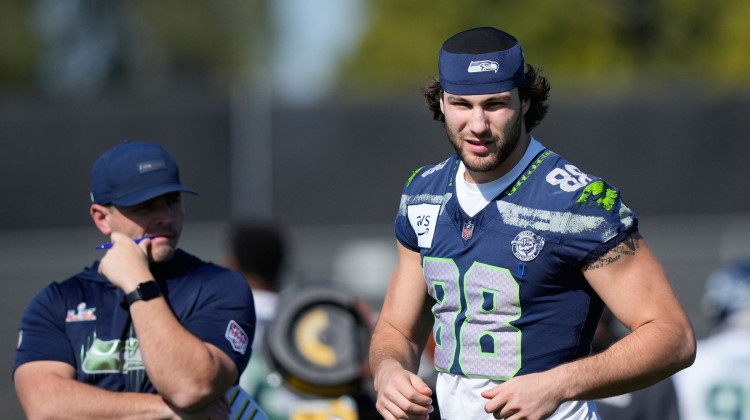Fazle has been making music professionally for over a decade. His latest album is the culmination of a trilogy. It's called "GRXCK: Finale." Fazle spoke with WFYI Morning Edition host Ray Steele.
STEELE: Fazle, welcome.
FAZLE: I'm doing excellent. Ray, thank you very much for having me on, man. It's a pleasure. It's an honor, man. I've been excited to do this for a very long time.
STEELE: Some background for people who don't know you. You were not born in Indy, I don't think. How did you land here?
FAZLE: So I was actually born here. However, my father was in the military, so we moved from all over from different parts of the world. I like to say that I'm raised from the greatest parts of the world. I lived in California for a time. I lived in New York for a time. I lived in Hawaii for a time, if you could believe it, as well as Texas and a variety of other states.
STEELE: So how did you end up back in Indy?
FAZLE: So, unfortunately, my father passed when I was 12 years old, and we decided we needed to come back home to where family was so that we can develop our brains and just be emotionally attached to people within us that would understand that loss. It was hard for a while, man, you know what I'm saying? I still think about him a lot. You know, it's one of those things; it's just kind of heavy as you go through life. You're wondering, like, if he's proud of you or not, or what he could have taught you to get in better positions in your life, and how life would have been differently if he was still present.
But all in all though, man, like, I'm glad to be home, you know, I love home. But it is one of those things where you kind of just take with a grain of salt as far as just like, you know, being raised everywhere, because you get to see different cultures and see how other people are raised and not how different states coordinate different things. So yeah, I mean, you know, we back here with it.
STEELE: This album is called "GRXCK: Finale." GRXCX [pronounced Grock] is a character you've mentioned a lot in your career. Who is GRXCK?
FAZLE: So GRXCK is a tethered version of myself. So whenever I do albums, I create characters that are not necessarily alter egos, but tethered versions of myself and alternate realities that I've created. So GRXCK is one of those characters. His full name is actually Xavier GRXCK, is what it actually is. And he is a industry entertainment worker that was signed to into a very bad deal. And you know, ultimately, the trilogy is about him getting out of that deal and living in his fullest self. But each trilogy highlights a different aspect of that journey, almost kind of like a hero's journey type of situation, you know, and "Finale" encompasses just like what it means to have it all and then lose it all, is what it's really all about.
There's a lot of different central themes within the album, a lot of it dealing with purpose, a lot of it dealing with what's more important – fame or love – and just a variety of different things culminating into that album. But I will say that like GRXCK as a character is pretty much who I envision myself as as far as the entertainment goes. I would say he's the greatest entertainer in his field, but he doesn't get the respect or the flowers he deserves for it, is what I would say.
STEELE: How does that relate to the clown makeup that people – if they've seen your album covers or seen you, they'll see you wearing the clown makeup sometimes. What's behind the clown makeup?
FAZLE: Right? So you know, GRXCK is seen as kind of like a decorated clown in a sense, right? And it's kind of like a turn on something that was told to me within the scene. When I was first coming up, I was called a joke. I was called a clown. I was told not to be taken seriously. So I decided to take that and flipped it. And so and I'm like, OK, well, I'm gonna show you that this clown could do everything that you do but better, you know. And I figured, like, you know, if I do that I can hurt them or then hurt me. You know what I mean?
STEELE: That's something that strikes me about hip-hop – there are so many songs and so many albums about people feeling that kind of disrespect, and they're pushed back on it. Why do you think there's so much disrespect out there? Because everybody seems to have at least one record saying, "You said this about me, and now I'm going to show you."
FAZLE: It's all about just getting respect. Hip-hop is about respect. That's what it really like stems from, you know. So people want their respect and when they feel disrespected is one of those things where they just feel like they have to get it out there that like, you know, I'm not to be taken seriously in that field, you know, especially if you do this for a living or if you do this in hopes of it being a full -ime career one time in your future. So, you know, you just can't rock with disrespect by any means. So you know, hip-hop is a verbal art form, you know what I mean? When rocks are thrown, you either respond or people look down upon you. You know what I mean?
STEELE: There's a song on your album, and I wanted to especially mention this one because it was a song I heard, I believe before the album came out. It's called "Safe." As we are recording this, we're coming out of a weekend in which I believe at least 20 people were shot around Indianapolis. It was just one of those weekends that we have some times here in Central Indiana. What is the meaning of the song safe? It just struck me listening to that today, especially based on the theme of the song – based on the words that you added in there.
FAZLE: Yeah, man, "Safe" came from a very personal perspective of just like things that I've experienced here in Indy. We lose people all the time. You just never know. You know, I wrote the song from the perspective of my late mentor who also passed away from gun violence. His name was Richard Noel, aka Regal V., back in 2015. And, you know, I wrote "Safe" kind of just as a trauma response, in a sense.
I wrote it after experiencing a near death experience with my brother, Dorian Mays of SHUE Clothing. We actually were shot multiple times. And he's rendered unable to walk right now. And I was grazed, but like, in the grand scheme of things compared to his situation, it's a lot more dire. I just remember going over there to literally pick up samples for our clothing company, and one thing led to another and an altercation popped off,and somebody was actively shooting through the house. I literally had to call 911 and army crawl to get a towel to put to apply pressure to his wounds so that he would survive. It was just a traumatic moment, man. But, you know, at the end of the day, you know, after weeks went by of him just being in the hospital, I finally got to talk on the phone with him. And all we could say, was just like, "Yo, we made it home, bro. We made it home safe."
STEELE: How tough was it to put something like that on an album out there for the public's consumption?
FAZLE: I think is required. It's like I needed to get it off, you know, somehow. I know that, you know, people of my background struggle with, like, mental health and struggle with going to therapy. And, I think that we use other outlets as a means of our therapy, and I think music is is one of those therapies for me. I felt like it helped me, you know, internally feel like I can make this message like available for the public so that it may, you know, resonate with people who have been through similar things and I know that they have, because everybody's lost somebody. You know, it's it's one of those things where I feel like, no matter who you are, in some capacity you can understand because then that is ingrained in our heads. It's ingrained in our heads right? To ask each other yo, like text me when you're home safe, let me know that you made it home safe and if we don't follow up, we're used to like Yo, did you make home safe? So, I think that that's something that I feel like we as a sub geist, we as a culture can just like get behind and like I just I created it for for for for myself, but I also created it for people who I feel like could resonate with it, you know
STEELE: How do you define success with this album within your career? Because I read your social media. You seem like you're in a good place with everything right now. How do you determine whether this album is a success? And what standard is success, really?
FAZLE: Man, success is subjective, man. You know, at the end of the day, everybody views success from a different lens, Me, personally, as long as you're listening, I feel like that's a success. That's a dub [a win] on my end when you're dealing with with the realm of local music. You have to take every dub, every milestone into consideration you have to be happy about those things. Because if you're not happy about them, then who else is going to care? You know, I feel like success is a medium where it's just like you have to appreciate all that you've done within your personal sub geist before you can just be like, "Oh, like I'm not successful." A lot of people see monetary gain being just like the success point or the end all be all. I don't necessarily see it like that. I see successes like me even being here talking with you is a major dub.
I never got to do this before, so it's a success to me. And it's something that I would put into my books as being a win. You know what I mean? I've been getting booked out of state ever since the album drop. We got a show in Nashville in September, we got another show in New York in November. I'm just excited for the rollout and how everything has been coming, from the love, the compliments, the "Yo, this song really helped me get through the day," you know. It's just like a variety because I cannot create a graph with the spectrum of sounds. There's a whole variety of sounds on the album. So like people telling me like what their different favorites are, like seeing the different perspectives on everything – it's a beautiful thing. That's what I consider success, as far as the album goes.
STEELE: Fazle, It's been my pleasure to have you on. Thanks for coming by.
FAZLE: Thank you very much, Ray. It's been a pleasure.
FAZLE's new album is called "GRXCK: Finale." It's available wherever you get your music.
 DONATE
DONATE







 Support WFYI. We can't do it without you.
Support WFYI. We can't do it without you.